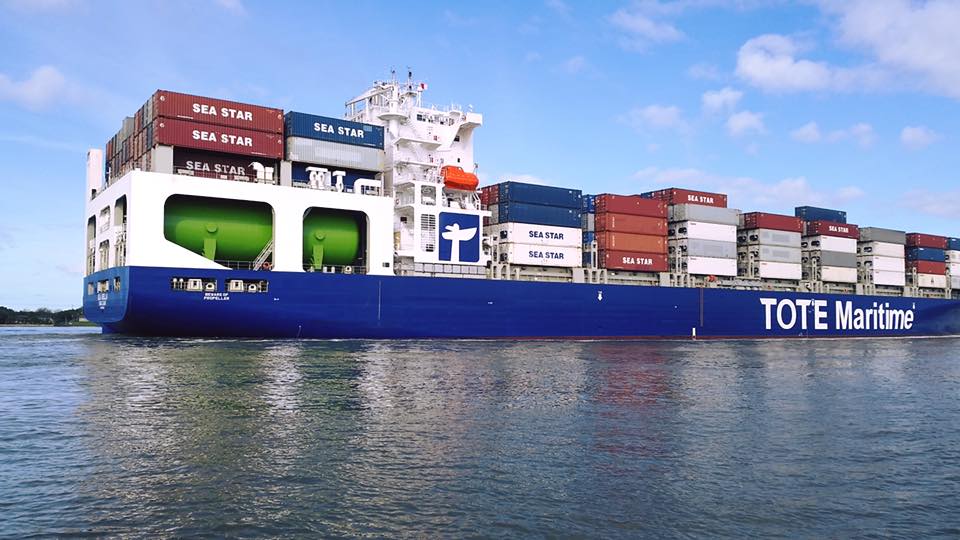Indian Seafarers Freed After Months of Detention at Yemen’s Ras Isa Port
India says it has secured the release of more than 150 seafarers who were stranded at Yemen’s Ras Isa Port, according to the Directorate General of Shipping. All 11 vessels...

File photo shows the Tote Maritime’s LNG-powered containership Isla Bella at the port of Jacksonville, Florida. Photo: JAXPORT Marine Unit via NASSCO
![]() By Julie Gordon WASHINGTON, June 28 (Reuters) – With new global emissions standards looming, the marine shipping industry is increasingly looking at liquefied natural gas as alternative to high-sulfur bunker fuel, shipping and energy executives said at a global gas summit this week.
By Julie Gordon WASHINGTON, June 28 (Reuters) – With new global emissions standards looming, the marine shipping industry is increasingly looking at liquefied natural gas as alternative to high-sulfur bunker fuel, shipping and energy executives said at a global gas summit this week.
Already used to fuel ferry fleets and cruise ships, LNG is gaining traction among freight and cargo shippers, despite a reluctance by the entrenched industry to make major changes. The stakes are high: the global shipping fleet now consumes about 4 million barrels per day of high sulfur fuel oil.
“Ship owners are very conservative, they’re generally a little slower to act… But it’s going to happen,” Peter Keller, chairman of SEA\LNG and executive VP of maritime firm Tote Inc, told Reuters at the World Gas Conference in Washington.
“Every year the percentage of LNG powered ships out of the new-build market is increasing.”
LNG bunker demand from the shipping sector is expected to be between 20 to 30 million tonnes per annum (Mtpa) by 2030, up from less than 1 Mtpa today, according to forecasters.
Driving the shift are new rules from the International Maritime Organization that cut the allowed sulfur content in marine fuel to 0.5 percent from 3.5 percent by January 2020. LNG is virtually sulfur free.
It is the most significant change faced by the global shipping sector in decades, and many in the industry remain divided over what fuels ships will use and how many vessels will simply break the rules.
Keller, whose firm operates LNG container ships and is converting its cargo ships to the supercooled fuel, said the big limitation has been the so-called “last mile of delivery,” a lack of availability of the fuel at port.
But that is changing.
“In 2017, there was only one bunker vessel for LNG anywhere in the world. Today, there are five and 14 more on order,” he said, adding that the vast majority of bunker ports in the world are expected to have LNG capabilities in place by 2020.
LNG production around the world continues to ramp up thanks to low-cost production in the United States and rising demand from China and other markets, where natural gas is being used to offset more carbon intensive fuels in power generation and transportation.
LNG for marine transport operates much like the LNG export industry, but on a smaller scale. Shippers sign long-term purchasing deals with producers, which allows those companies to build liquefaction capacity.
One such facility is FortisBC’s Tilbury plant, which can liquefy 5,000 gigajoules of gas per day and fuels BC Ferries’ fleet of LNG passenger ferries and Seaspan Corp’s B.C. fleet of LNG freight ferries.
Fortis sees huge opportunities for growth, not just in ferries but also for coastal freight shipping, said Sarah Smith, the company’s director of Natural Gas for Transportation.
“We need to build out a bunkering jetty at Tilbury to be able to fill bunkering vessels there,” she said, noting that British Columbia has first-mover advantage on becoming a bunkering hub.
Part of the draw of LNG over low-sulfur diesel or other alternative fuels is that even if emissions standards become more stringent in the future, natural gas falls well below any threshold.
“LNG is the fuel that is future proof,” said John Hatley, Americas VP Marine Solutions for Wartsila.
In terms of cost, building a new ship to run off LNG is comparable with traditional diesel fuel-powered ships.
But the fuel savings are immense.
“The fuel costs to operate on LNG is approximately half of what it cost to operate on ultra-low sulfur marine diesel,” said Deborah Marshall, a spokeswoman for B.C. Ferries, which runs four LNG ferries in the West Coast province.
For Keller, of SEA\LNG, the proof is in the engine room.
“When you go in the engine room of a ship, you’re typically gonna put gloves on, you’re gonna put a boiler suit on, you’re gonna do that, because it’s dirty,” he said.
“You go into the engine room of … our first LNG-powered container ship and it looks like it just came out of the yard yesterday.” (Reporting by Julie Gordon; editing by Richard Valdmanis)
(c) Copyright Thomson Reuters 2018.

Sign up for gCaptain’s newsletter and never miss an update

Subscribe to gCaptain Daily and stay informed with the latest global maritime and offshore news


Stay informed with the latest maritime and offshore news, delivered daily straight to your inbox
Essential news coupled with the finest maritime content sourced from across the globe.
Sign Up